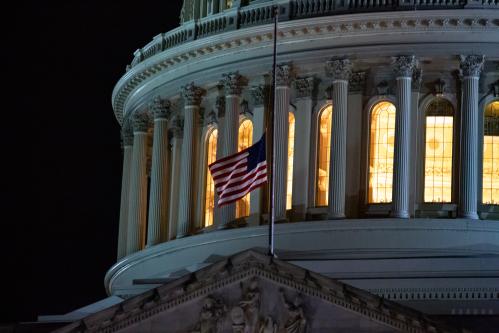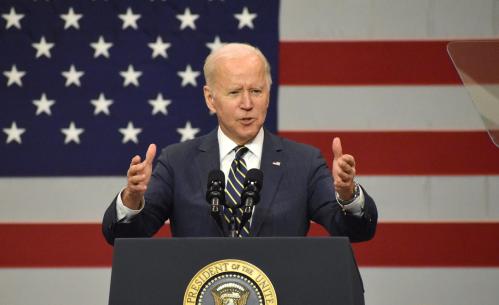It isn’t getting colder in Hell just yet, but the Democratic National Committee and its Rules and By-laws Committee does seem to be “getting warmer” in its efforts to create a new primary calendar for selecting delegates to its 2024 National Convention. As everyone knows, the early states are critical to the presidential nomination system. And, according to a draft resolution circulating before the next Rules Committee meeting, the DNC looks like it will seriously consider changing the traditional opening sequence of the nomination system.
As things stand right now, the first state to hold a delegate selection process in 2024 would be Iowa, whose 80% white electorate hasn’t voted for a Democratic presidential candidate in a decade. As Gilberto Hinojosa, chairman of the Texas Democratic Party said of the current primary calendar, as it was getting underway in Iowa in 2020, “It is bizarre. It makes absolutely no sense except for tradition, and sometimes tradition doesn’t get us anywhere.” The second state would be New Hampshire, which may have more of a historical and legal claim to be “first in the nation” but whose electorate is even whiter, 90%, than Iowa’s. At least it can claim a greater tendency to vote Democratic in statewide contests. Most importantly, neither state voted for Joe Biden’s candidacy in 2020, thus depriving them of the ability to use their loyalty to the incumbent President to block this latest effort to restructure the calendar as has happened so often in the past.
Under the committee’s proposal, states wishing to help kick start the 2024 campaign would have to apply to the DNC’s Rules and By-laws committee, which would base their final decision on which states get to go early from among those who:
- Commit to holding a primary to choose convention delegates,
- Demonstrate their general election competitiveness, and
- Are demographically diverse.
Iowa loses on all three counts; New Hampshire is on shakier grounds but could take a simple step to solidify their claim.
Since the party will want to get an early reading on the preferences of all four regions in the country, if the party passes over Iowa, their biggest decision will be on which Midwest state to choose to take Iowa’s place on the calendar. The most likely choice, given the criteria, would be Michigan, whose attempt to go early in 2008 resulted in each of the delegates selected in the primary held “outside the window” of the party’s primary calendar being given only a half of a vote at the Denver convention that nominated Barack Obama. Despite that punishment and Hilary Clinton’s primary victory in Michigan, the former President carried Michigan in the general election by over 800,000 votes, but it has become much more competitive lately. That, along with its diversity and strong labor presence will allow Michigan Democrats to make a strong case that they are the Midwest state that best meets the DNC’s proposed criteria of diversity and general election competitiveness.
The only other real choice facing the DNC, should it adopt the co-chair’s proposal, is which eastern state to choose to go early, if not New Hampshire. South Carolina and its powerful spokesperson, Congressman James Clyburn, will successfully argue for their continued inclusion as the early southern state, not just because of the state’s large percentage of African American voters but, more quietly, their key role in President Biden’s nomination. Nevada has already taken steps to change their early caucus to a primary. Even without the recently departed Senator Harry Reid around to argue their case, the strong union and Latino presence in this western region state’s electorate makes them almost a shoo in for an early spot. That leaves the question of New Hampshire’s early status on the table.
As was argued back in the 1980s when I chaired the party’s rules commission, one of the reasons for having a few states go early is the opportunity it provides for a relatively unknown candidate, such as Jimmy Carter, to campaign on a smaller budget until they become better known. New Hampshire’s traditional primary style of campaigning in small gatherings in small towns may be more myth than reality, but the stories the national press corps files every day during their primary does allow candidates to become better known nationally. However, their media market, which is mostly driven by Boston television, is relatively expensive for the size of their electorate.
This potential weakness is, however, not a problem if the competing eastern state is New Jersey, which it appears to be at this stage of the deliberation. To reach New Jersey voters, candidates have to buy time on New York media, the most expensive market in the country. Add to that New Jersey’s lack of any history of effective one on one campaigning for statewide office and New Hampshire still looks like it will survive this new process. There is, however, one thing New Hampshire can do to assure their first in the nation status, at least for 2024.
To deal with the state’s lack of diversity, the party should permit only registered Democrats to vote in its primary in 2024, abandoning their tradition of allowing voters from one party to vote in the other party’s contest. The courts have given the Democratic party the authority to enforce such a rule, in a case that tested that very provision (Rule 20B) in the rules written by what is generally known as the Winograd Commission for the 1980 nominating process. (Yes, I was the Chair of that Commission and, full disclosure, also the Chair of the Michigan Democratic Party.) The policy argument in favor of enacting such a rule is easily made by citing the potential for mischief if Trump voters are given a chance to vote against President Biden in the primary. But in terms of the DNC’s proposed criteria for being an early state, such a “Democrats only” electorate would be more proportionally diverse and give greater weight to the state’s burgeoning suburban vote that will be so crucial for victory in the general election. If the New Hampshire Democratic party enacts such a provision as part of their application to the DNC, their already good chances to remain “first in the nation,” increase to almost a certainty.
As I wrote for Brookings almost two years ago, “although no set of rules can guarantee the selection of a presidential nominee who is prepared to meet the challenges the country now faces, by increasing the participation of as many Democrats as possible in a process that better reflects the makeup of today’s Democratic coalition, the party can improve the odds that its next nominee will win the prize national politicians dream about.” Let’s hope for the sake of our American democracy the party surprises the pundits and does the right thing this time.






Commentary
Democrats have a chance to get their rules right for 2024
March 25, 2022